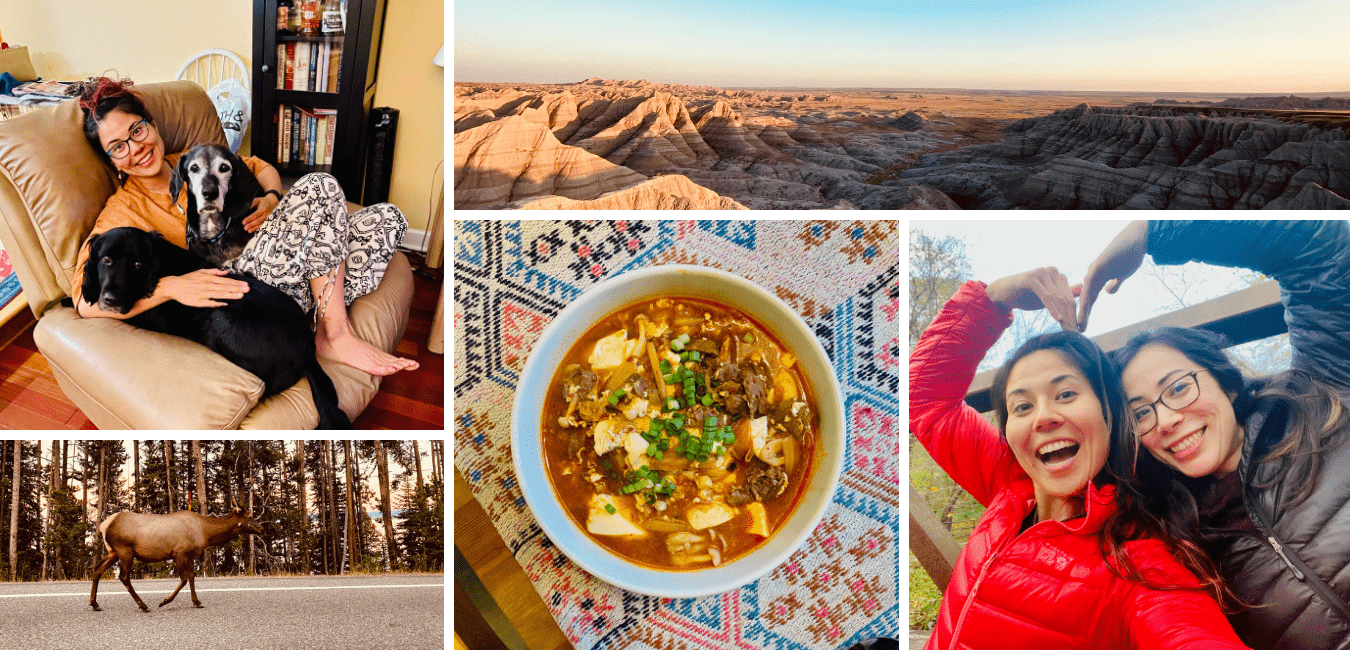Dear Friends,
I’ve been thinking a lot lately about what it means to be deeply well and whole…for myself, for those I love & support, for our society…especially given this moment in time when the upheavals and tensions we seem to be experiencing as individuals and as a global community are amplified.
I’ve always believed that self-care is more than going to the gym & using up vacation days. I think that if we want to cultivate “wellness” in our communities, workplaces, & home spaces, we need to go beyond our often surface-level understanding of “self-care.” We need to invest in cultivating mindsets & practices that are more transformative & lasting and that lead to both shifts in action around our personal well-being and to a different societal relationship with the concept of wellness.
I recently picked up the book Burnout by Emily & Amelia Nagoski and this quote is sticking with me:
“Wellness is the freedom to move fluidly through the cycles of being human.”
I’m thinking a lot about how often I see us (myself & others) doing all manner of things that inhibit our ability to move through & among our own humanity. I’m reflecting on how often we refuse to rest when we are tired, how we treat our emotions as unwelcome visitors, how we disconnect from our joy because we don’t feel entitled to it, how we speak to & judge ourselves when our lived human experience doesn’t match whatever archetype we’ve been told is ideal…and so forth.
I’m also thinking about the various systems & power dynamics that make it harder for different people—women, minorities, people of varying ability & access levels—to truly embrace the cycles of their own humanity without fear. How much more vulnerable & threatening can it be to fully feel & move through the range of human emotions when doing so includes regular experiences of oppression, violence, & dehumanization?
I’m thinking about how shifting our relationship to what it means to be human is something we each need to find our way to personally so that, as individuals, we can thrive in whatever life soil we are planted in right now. I’m also confident that as a collective we simultaneously need to be interrogating & shifting our archetypes, expectations, institutions & practices at a systems level so that we can create the social & economic conditions for all people to truly be able to embrace the fullness of their own humanity. We need to create businesses, organizations, & nations that center our humanity & support wellness for all – not operate as forces that we have to work around in order to be human.
Last month, I mentioned that as part of my own exploration of what wellness means and looks like in my life, I was committing to getting curious about my own relationship with joy and trying some things out to see if I could live more joyfully amidst the storm & chaos of now.
Here are two lessons I’m taking away from my month of experimentation.
Lesson 1:
Everyday joy piles up…in good ways…and doesn’t have to make sense to have value.
I’ve been working on my relationship with joy for a very long time. Like many people I know, I didn’t grow up in a household where we prioritized joy or where “because it brings me joy” was a justifiable reason to do something. Thus, my joy muscle has historically been a little underdeveloped. 😉 Over the last decade, I’ve really strengthened it, particularly, as it relates to many “big rocks” in my life. For example, I now consistently choose friendships, projects, clients, hobbies, and travel destinations, in part, based on how much joy & satisfaction they bring to my life. And as a result, I’ve seen my overall sense of wellness increase many times over. I am happier now than I have ever been!
And yet, as I looked closer at my relationship with everyday joy, I noticed a lot of little places where I still shut down my own joy without even thinking about it:
“You want to read the ending of that book first? You really should read it from start to finish.”
“You want to make soup for dinner? It would be better if you make real food instead.”
“You want to dye your hair magenta? Red is a little more subtle.”
Seems innocuous, right?
Actually not. This month, I noticed how shutting down some of my small instinctual pulls to joy ultimately piled up into bigger feelings of anxiety & exhaustion. So I decided to run an experiment: Each time I caught myself working against joy, I practiced naming what was happening & choosing joy instead. This sounded like “Oh look, we are shutting down our joy again; that’s cool. Let’s follow it instead.”
And follow I did. I watched a LOT of k-dramas on Viki (if you want to watch something magical, check out Goblin and Tail of the Nine), I gave myself permission to read the ending of books first (and to sometimes never read the beginning or middle). I consumed less news & podcasts on mindfulness & leadership and more science articles & design magazines. I cooked a lot of soup and ate a lot of Japanese food. I spent time making my food look pretty on plates before I ate it. I sang a lot of Barbra Streisand & John Legend songs at my piano. I dyed my hair purple & blue. I organized my clothes in my suitcase by color & fabric type.
And I learned some things:
- Many of the everyday things that bring me joy don’t make logical sense (Why do I read the ends of books first?) or provide tangible value (I’m not more productive because I plate up my food beautifully), but that’s okay…because not everything needs to make sense or make me more productive to be worth doing.
- A good many of the small things that bring me joy have no real impact on others. I’m really not inconveniencing anyone by cooking a lot of soup—so the ambient fear I often have that I can’t follow my joy because it will harm others is, in many cases, unfounded. So I can just know that & act through it.
- “Because it brings me joy” is actually a perfectly fine reason to do something. Often, by giving myself permission to do small joyful things every day, I end up feeling more energized & less stressed…which, though not the point, often does help me be more present & productive.
Lesson 2:
Joy amplifies joy and tapping into my own joy often gives others permission to do the same.
I often worry that my joy does or will offend others. I value being situationally aware. I know that acknowledging and, at times, mirroring other people’s emotional state, can help them feel more seen & known. And it’s important to me that people generally feel like they can show up in their wholeness & messiness when we interact. I actually find the complexity of life very compelling & beautiful and I want to hear about other people’s peaks & valleys as much as I want to embrace my own.
Thus, in my mind, I sometimes worry that by being joyful—by saying I want to prioritize joy, by choosing to focus on what is good in my life, what I have, & what I can learn, more so than on where I’m suffering or lacking—I will make others, especially those who are experiencing real worry & anxiety, uncomfortable. I fear that these people will accuse me of “toxic positivity,” suggest that I am “out of touch,” decide that I’m “just a silver linings” kind of person who can’t be with the complexity & multifaceted nature of life, and thus will bow out of interacting with me.
This is part of my own trauma. Once upon a time I was in a relationship with a lot of people who used my positivity & perspective as a way to control & demonstrate power over me. And the scars from those experiences, while fading, are still visible in my heart & mind.
But I have had enough experiences to know in my gut that not doing things out of fear that they will offend others is rarely a path that leads to my own healing & empowerment. So this month I experimented with sharing my joy with others, even when I felt anxious about how they would respond. I shared with friends, colleagues, & family members. And here’s what I learned:
Yes, my joy sometimes does result in reactions from others I don’t love.
This month, there were people—friends, relatives, colleagues—that I shared my excitement & learnings with who responded in all sorts of interesting ways. Some ignored what I shared all together, some picked my joy apart with pointed questions, & some centered their own struggles. I experienced one friend who, each time I shared something I was joyful about, immediately pivoted the conversation to herself & her family, and spoke about how hard this moment in time is for her.
While these reactions didn’t feel great to me – they also didn’t align with my worst-case scenario fear. No one accused me of toxic positivity or being unable to bear witness to the complexity of the human experience, and no one, to my knowledge, opted out of a relationship with me.
Additionally, as I watched some of my loved one’s responses to my joy play out, I found myself wondering about their own relationship with joy. I realized that the people who weren’t able to be present with me in my joy seemed to struggle to be present with their own joy. This reminded me that so often, people’s responses to me aren’t totally about me…just as my responses to others aren’t totally about them. I found myself more empathetic to certain friends & family members I’ve found myself historically frustrated by.
I also found myself clearer on how I want to interact with these folks in the future around joy and experimented with setting some boundaries.
In some of these relationships where friends & family members ignored, dismissed, or decentered my joy in order to center their struggle, I tracked how much time I generally dedicate in conversations to holding space for them to talk about what is awake & alive for them, versus how much they inquire about me or hold space for me to share without interruption about what matters to me. I noticed how unbalanced the percentages are. I spend waaaaay more time listening to their struggles & thoughts than they do inquiring about mine. I noticed how this imbalance makes the dismissal of my joy & excitement by them even more painful because it’s underscored by a general lack of relational parity.
So I started experimenting with leaning back a bit in these relationships. I’m asking fewer questions, giving a little less validation, sending a little less time & energy in their direction, not out of spite, but out of a desire to rebalance the relationship scales. It feels awkward and causes me fear & anxiety at times…and also, in my experience, when I lean back, sometimes others step up & lean in. I’ll have to wait and see.
I’m also asking myself who in my life truly deserves to hear about my joy?
I notice how feeling & expressing joy can be as vulnerable an experience for us humans as feeling & expressing struggle. Just as not everyone in my life has earned the right or shown the ability to be with me in my struggles, not everyone in my life is capable of being with me in the tenderness of my joy. And that’s okay. I can be choiceful about who I share my joy with; this is part of me exercising self-care, stepping up to take responsibility for honoring my own needs…even, and especially, when I’m afraid. This is how I build trust with myself.
At the same time, one of the most wonderful discoveries I made this month as I shared my joy practices with others around me is how many people really did join in with me. Some people became accountability buddies, sending text updates, & pictures of small joyful things in their lives. It was like a joy fest. On calls, I would watch & feel the level of enthusiasm in people’s voices rise when talking about what they were excited about & grateful for, watch their facial expressions & body language lighten, feel some of the heaviness that’s been a near-constant undercurrent lift a little. I had some incredible conversations with people about what self-care really means & looks like for them, about new passions they are discovering during this time, & about innovations they creating among the many constraints of today. I felt filled with hope & a sense of possibility, something I think is an often under talked about element of wellness.
I noticed how, as much as my joy can trigger others, it can also act as a permission slip and an amplifier.
So many of us are walking around present to the struggle, sorrow, & sadness of life, hiding our joy away in the cobwebby corners of our hearts & minds. I found a great many of my friends & family members waiting to exhale on their joy…and I noticed that in sharing about my own commitments & practices around joy, I was able to encourage them to tap into their own.
My exploration of joy continues, and I hope yours will too. If you, like me, find yourself hiding some of your own joy, worried about what centering it might signal about you or how it might impact others, I invite you to step into your fear with some curiosity & a sense of experimentation:
- What is your current relationship with joy? Are you embracing it? Judging it? Hiding from it? Living boldly through it? What do you want your relationship with it to be?
- What brings you joy? If you don’t know – that’s okay, no judgment – and how can you start discovering this in tiny ways? What are the things you are excited to do “just because”? What if you just did them?
- What might it mean to center joy in your life more? What if you trusted that in doing this you weren’t negating the struggles you experience but fueling yourself to move through them?
- And as you come to learn what brings you joy, who can you share that joy with? How can you bear witness to the tenderness of other people’s joy as well so that joy can be amplified around you?
I’d love to hear what you’re learning and experimenting with! Share on my Instagram @wayfindingwisdom or shoot me an email at info@wayfindingwisdom.com.
Be well, be you,
Alice
🙂




